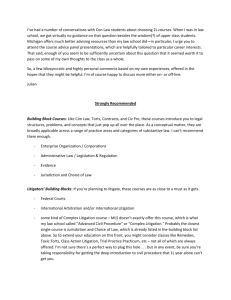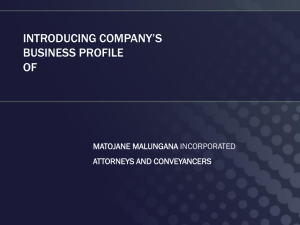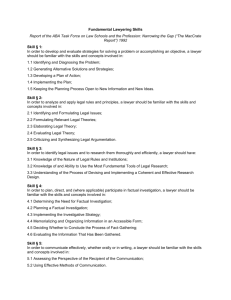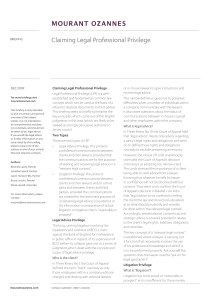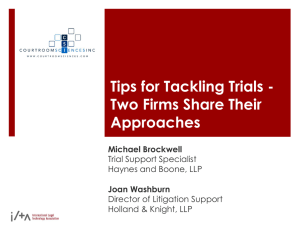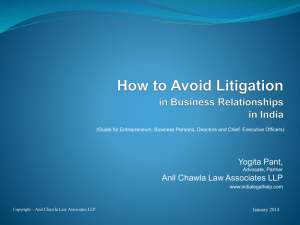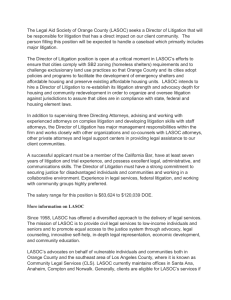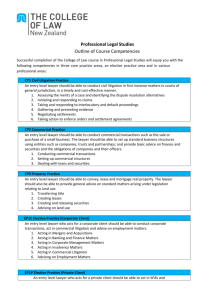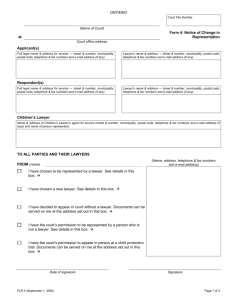Misleading Presentation - TechnologyInLitigation.com
advertisement
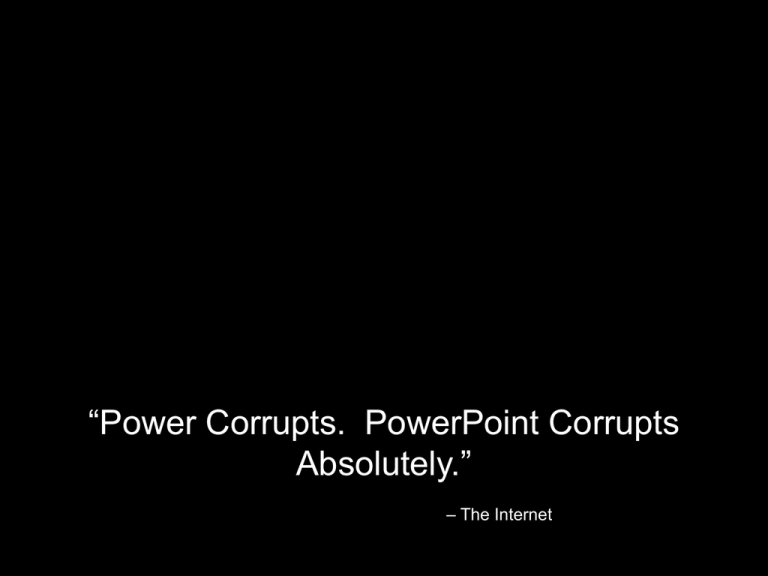
“Power Corrupts. PowerPoint Corrupts Absolutely.” – The Internet Four Horsemen of the Digital, Ethical Apocalypse Alvin F. Lindsay Hogan Lovells Miami, Florida Blowing the Privilege Mining for Data Record Deletion Failure Misleading Presentations Blowing the Privilege Duty to Protect the Privilege 4-1.6 Confidentiality of Information A lawyer shall not reveal information relating to representation of a client . . . unless the client consents after disclosure to the client. Blowing The Privilege: Never Been Easier Recent Headlines Recent Headlines Recent Headlines Recent Headlines 1. PW protect all devices 2. Encode critical data 3. Watch what you Tweet 4. Sanitize that e-mail 5. Don’t e-file private data 6. Be aware of your data Mining for Data Metadata: Data About the Data Embedded Data: Data in the Data Metadata Mining Florida Rule of Professional Conduct 4-4.4(b) A lawyer who receives a document relating to the representation of the lawyer’s client and knows or reasonably should know that the document was inadvertently sent shall promptly notify the sender. 1. Don’t look for hidden data 2. If you find, notify 3. Sanitize that e-mail Record Deletion Failure When Can Data be Deleted? • Governments permit • Internal policies permit • Litigation status permits Government Document Preservation Requirements International, Federal, State International Requirements • Privacy laws – EU Data Directive 95/46/EC • Blocking statutes – French Penal Code Law No. 80-538 Federal Requirements • Federal Records Act, 44 U.S.C. 3101 – policies, decisions, important meetings, agency action, etc. • Family and Medical Leave Act, 29 CFR 825.500 – employer obligations under the act Federal Requirements • Securities Exchange Act of 1934 § 17(a) – broker-dealers records on customers, purchases and sales, associated persons, complaints, etc. • Sarbanes Oxley §§ 802, 1102 – public companies and accountants to preserve financial records for seven years State Requirements Uniform Preservation of Private Business Records Act. (805 ILCS 410/2) (from Ch. 116, par. 60) Sec. 2. Unless express provision is made by law for the period during which they must be preserved or for the condition upon which they may be destroyed, business records which persons by the laws of this state are required to keep or preserve may be destroyed after the expiration of three years from the making of such records without constituting an offense under such laws. This section does not apply to minute books of corporations nor to records of sales or other transactions involving weapons, explosives, poisons or other dangerous articles or substances capable of use in the commission of crimes. (Source: Laws 1957, p. 123.) Typical Healthcare Business Subject To: 1. Department of Labor (DOL) 2. Equal Employment Opportunity Commission (EEOC) 3. Occupational Safety and Health Administration (OSHA) 4. Food and Drug Administration (FDA) 5. Veterans Health Administration (VHA) 6. Nuclear Regulatory Administration (NRA) 7. State (real estate, pharmacy, accounting) 1. Know your business 2. Know international, federal, state law 3. Define a retention program 4. Stick to it Internal Policies Make and Follow Retention Plan Recommended Retention Periods Record Suggested Period of Retention Remarks Administrative Offices Accident/incident reports 6 years Annual reports Permanent Appraisal reports Permanent Articles of Incorporation Permanent Birth records Permanent Bylaws Permanent Daily census 5 years Communicable disease reports 3 years Construction records Permanent Correspondence 5 years Keep only that of continuing interest. Review annually. Licenses, permits, contracts Permanent Admissions and Discharges Listings 6 years Register Permanent Business Office Alien-statement of income paid As long as contents may be material in the administration of an Internal Revenue Law26 Bank deposits 2 years Bank statements 6 years Budgets 5 years Cash receipts 6 years Cashier’s tapes 6 years Charge (slips) to patients 5 years Check vouchers 10 years Checks (cancelled) 7 years Check registers 6 years Correspondence Credit and collections General Insurance 7 years 6 years 4 years Litigation Preservation Requirement Zubulake v. UBS Warburg LLC “Litigation Hold” “Monitor Compliance” “Data Policies and Architecture” “Key Players” “Safety of Data” “Spoliation” Zubulake V “Now that the key issues have been addressed and national standards are developing, parties and their counsel are fully on notice of their responsibility to preserve and produce electronically stored information.” 1. Establish and monitor litigation hold 2. Know retention policy 3. Know computer architecture 3. Ensure data safety 4.Take advantage of Rule 26(f) conference 5. Address e-discovery early in case Misleading Presentation Florida Rule of Professional Conduct 4-3.4 Fairness to Opposing Party and Counsel A lawyer shall not: (a) unlawfully obstruct another party's access to evidence or otherwise unlawfully alter. . . a document or other material that the lawyer knows or reasonably should know is relevant to a pending or a reasonably foreseeable proceeding; [or] (b) fabricate evidence, Florida Rule of Professional Conduct 4-3.3 Candor Toward the Tribunal A lawyer shall not knowingly . . . make a false statement of material fact or law to a tribunal .... Florida Rule of Professional Conduct 4-3.2 Expediting Litigation A lawyer shall make reasonable efforts to expedite litigation consistent with the interests of a client. CASELOAD STANDARDS Annual Non-Capital Felony Caseload 450 400 350 300 250 200 150 100 50 0 ABA FPDA B&B FGC PD-11 “Inappropriate” MCA Felony Mental Health Drug Court JSAP ERU Bond Hearings Training Attorneys Supervising Attorneys “Appropriate” Division Attorneys MCA Felony Mental Health Drug Court JSAP ERU Bond Hearings Training Attorneys Supervising Attorneys Always take the high road . . . Lagniappe TechnologyInLitigation.com Thank you! Alvin F. Lindsay Alvin.Lindsay@HoganLovells.com
